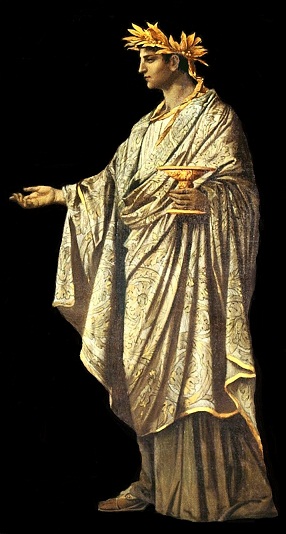Agathon (Agathon Agathon)

Playwright, Composer. A master of Ancient Greek tragedy, he lived from approximately 448 BC to 400 BC. Agathon was once mentioned with the “Big Three” of that genre, Aeschylus, Sophocles, and Euripides, but virtually all of his work is lost. We learn of his importance in the development of drama through the writings of others, primarily Aristotle’s “Poetics” (c. 335 BC). He is better known today for his principal role in Plato’s philosophical dialogue “Symposium” (c. 385 BC). Agathon was born in Athens into a wealthy family. In 416 BC he won first prize at the prestigious City Dionysia festival. Among his tragedies were “Antheus”, “Mysians”, “Telephus”, “The Destruction of Ilion”, and “Thyestes”. Famed for his good looks, effete elegance and generous hospitality, he was often courted by the local elite. He was the lifelong companion of an older aristocrat named Pausanias and his homosexuality was an open secret until it became the sport of comic poets. Aristophanes made Agathon a character in his comedy “Thesmophoriazusae” (411 BC), coyly linking his reputed effeminacy to his art: he is writing a tragedy, and to create a female role he must dress and act the part. The two playwrights, who were about the same age, seem to have been friends offstage. Aristophanes satirized him mildly compared to his perennial target Euripides, even though both were guilty of breaking with the traditions of Greek drama. In 407 BC, Agathon and Pausanias accepted an invitation from Archelaus I of Macedon to visit his court at Pella, where Euripides and other artists had gone to escape the instability of Athens during the final phase of the Peloponnesian War. In “The Frogs” (405 BC) Aristophanes had the god Dionysus proclaim Agathon “a good poet”, sorely missed by his fellow Athenians. His absence became permanent – he died at Pella around the turn of the 4th Century BC. He was not yet 50. In Dante’s “The Divine Comedy” (1321) Agathon and Euripides are found in Limbo among the pagan Greek poets “who once wore laurel upon their brows”. This makes it tempting to imagine how much of Agathon’s work may have survived until the Middle Ages – we have fewer than 40 lines and a handful of play titles. According to Aristotle he was an innovator who showed “marvelous skill in the effort to hit the popular taste, to produce a tragic effect that satisfies the moral sense”. He wrote the first ever tragedy – “Antheus” – that was completely original in subject and characters, instead of borrowing them from stock mythology as was customary. His treatment of myths was likewise individual, spicing the tales with invented plot twists and surprise endings, occasionally at the risk of straining credulity. Aristotle quoted him justifying this approach with the line, “It is a part of probability that many improbable things will happen”. As an exponent of 5th Century “New Music” he was the first to compose choral songs that served only as interludes with no relation to the plot, while the music itself was described as sensual and crowd-pleasing. By eliminating the dramatic (or commentative) function of the chorus, Agathon started a trend that helped speed Classical Greek tragedy to its decline; but it influenced Greek Middle and New Comedy, and was a major step towards the division of plays into acts. Agathon’s verse was ornate and highly stylized, filled with antithesis, epigram and metaphor; some considered it decadent and lacking in force. Style apparently meant a lot to him. When someone suggested his tragedies would be more effective if he dropped the literary mannerisms, he replied, “You fail to grasp how that would take the Agathon out of Agathon’s plays”. In time his poetic excesses fell out of favor and it is probably thanks to Aristotle that a single Agathon quote made it into anthologies: “This alone is denied even to God: the power to undo the past”. “Symposium” is one of the fictional dialogues Plato wrote to immortalize his teacher, Socrates. It takes place at the home of Agathon, who is hosting a banquet to celebrate his victory at the City Dionysia. The nature of love is explored in a series of speeches by some of the guests, including Socrates, Aristophanes, a physician, a lawyer (Pausanias), and later the drunk, party-crashing playboy Alcibiades. Each eulogy is defined by the speaker’s profession or attitude. When Agathon’s turn comes Socrates teases him for being nervous, remarking that he appeared so confident before the large Dionysia audience the previous day. Agathon retorts, “Do you think that my head is so full of the theatre that I lack the sense to realize how much more formidable a few good judges are than many fools?” His speech on Eros abounds with attractive but shallow rhetoric that falls apart under Socrates’ questioning, a dialectic intended to confirm Socrates’ (and Plato’s) mistrust of poets in general. Ever the gracious host, Agathon stays up until dawn with the tireless philosopher and Aristophanes, discussing ideas on playwrighting. Of the various artworks inspired by this dialogue, the most famous visual representation is the painting “The Symposium of Plato” (1869) by Anselm Feuerbach, with Agathon as the central figure. In the 1950s it was reproduced on the Greek 20 drachma banknote. (bio by: Bobb Edwards)
Born
- January, 01, 1970
- unknown
Died
- January, 01, 1970
- unknown
Cemetery
- Greece

